Vaccination Hesitancy: Social Determinants, Health Priorities Explored
VerifiedAdded on 2023/01/19
|7
|1579
|61
Report
AI Summary
This report examines vaccination hesitancy as a significant public health issue, detailing its impact on individuals, families, and communities, and its relationship to Australian National Health Priorities. It explores the connection between vaccine hesitancy and social determinants of health, such as confidence, convenience (especially among those in poverty), and education levels, highlighting how these factors influence vaccination uptake. The report also emphasizes the crucial role of nurses in addressing vaccine hesitancy through education, counseling, and building trust with parents, ultimately aiming to increase vaccination rates and prevent infectious diseases. A pamphlet promoting vaccination is included, reinforcing the importance of timely immunizations and access to healthcare for infectious diseases. The report concludes by advocating for increased awareness and government initiatives to combat vaccine hesitancy and improve public health outcomes.
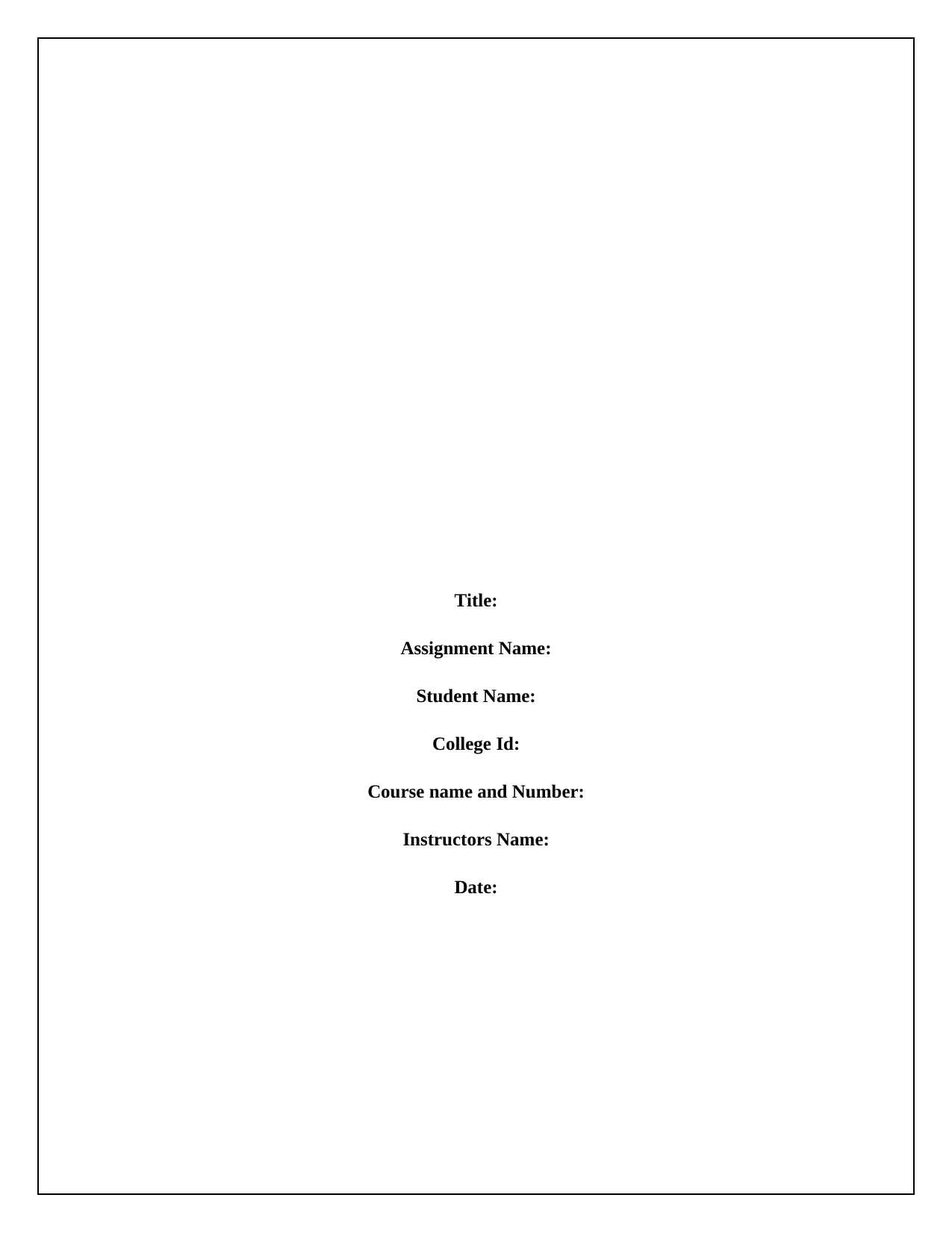
Title:
Assignment Name:
Student Name:
College Id:
Course name and Number:
Instructors Name:
Date:
Assignment Name:
Student Name:
College Id:
Course name and Number:
Instructors Name:
Date:
Paraphrase This Document
Need a fresh take? Get an instant paraphrase of this document with our AI Paraphraser
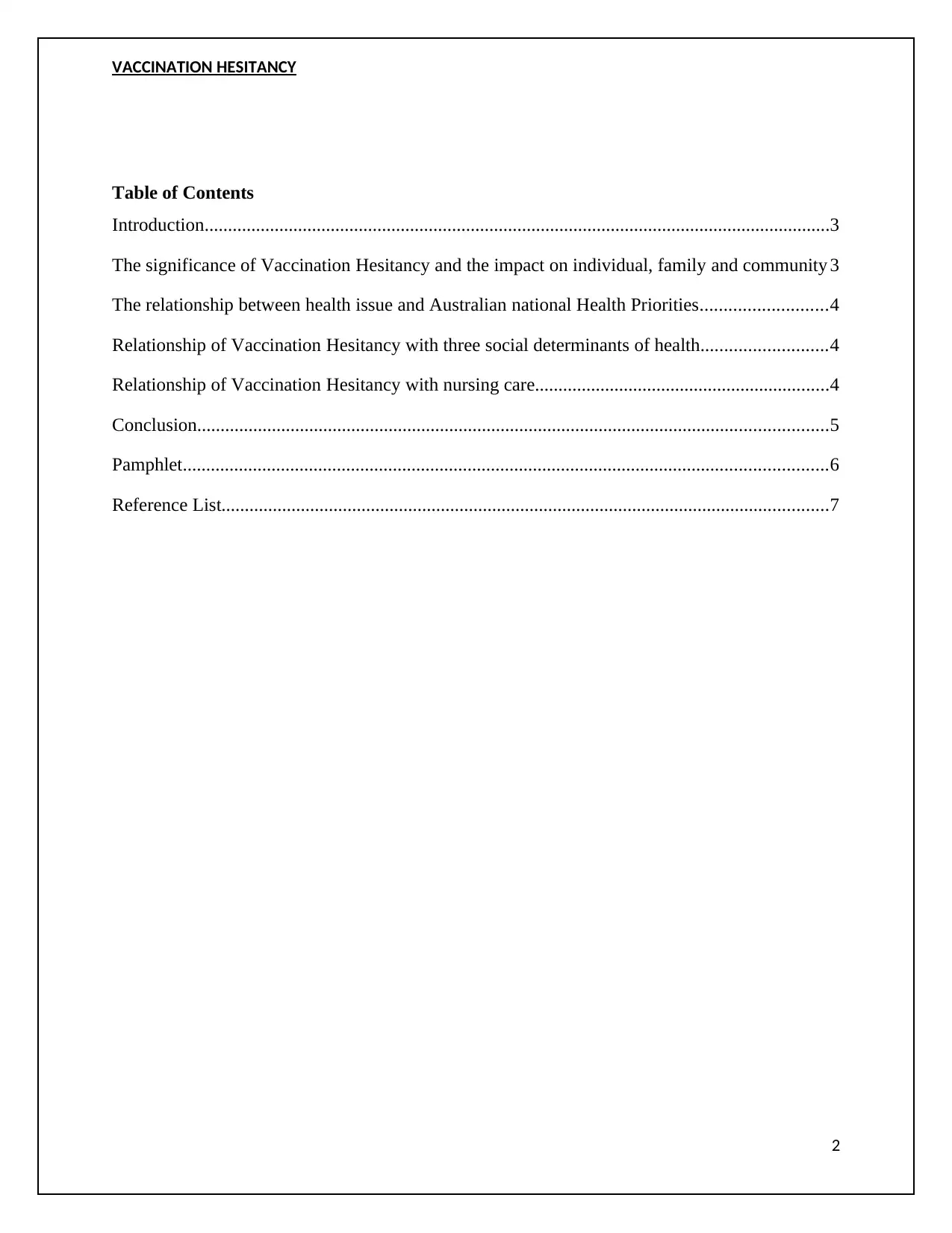
VACCINATION HESITANCY
Table of Contents
Introduction......................................................................................................................................3
The significance of Vaccination Hesitancy and the impact on individual, family and community 3
The relationship between health issue and Australian national Health Priorities...........................4
Relationship of Vaccination Hesitancy with three social determinants of health...........................4
Relationship of Vaccination Hesitancy with nursing care...............................................................4
Conclusion.......................................................................................................................................5
Pamphlet..........................................................................................................................................6
Reference List..................................................................................................................................7
2
Table of Contents
Introduction......................................................................................................................................3
The significance of Vaccination Hesitancy and the impact on individual, family and community 3
The relationship between health issue and Australian national Health Priorities...........................4
Relationship of Vaccination Hesitancy with three social determinants of health...........................4
Relationship of Vaccination Hesitancy with nursing care...............................................................4
Conclusion.......................................................................................................................................5
Pamphlet..........................................................................................................................................6
Reference List..................................................................................................................................7
2
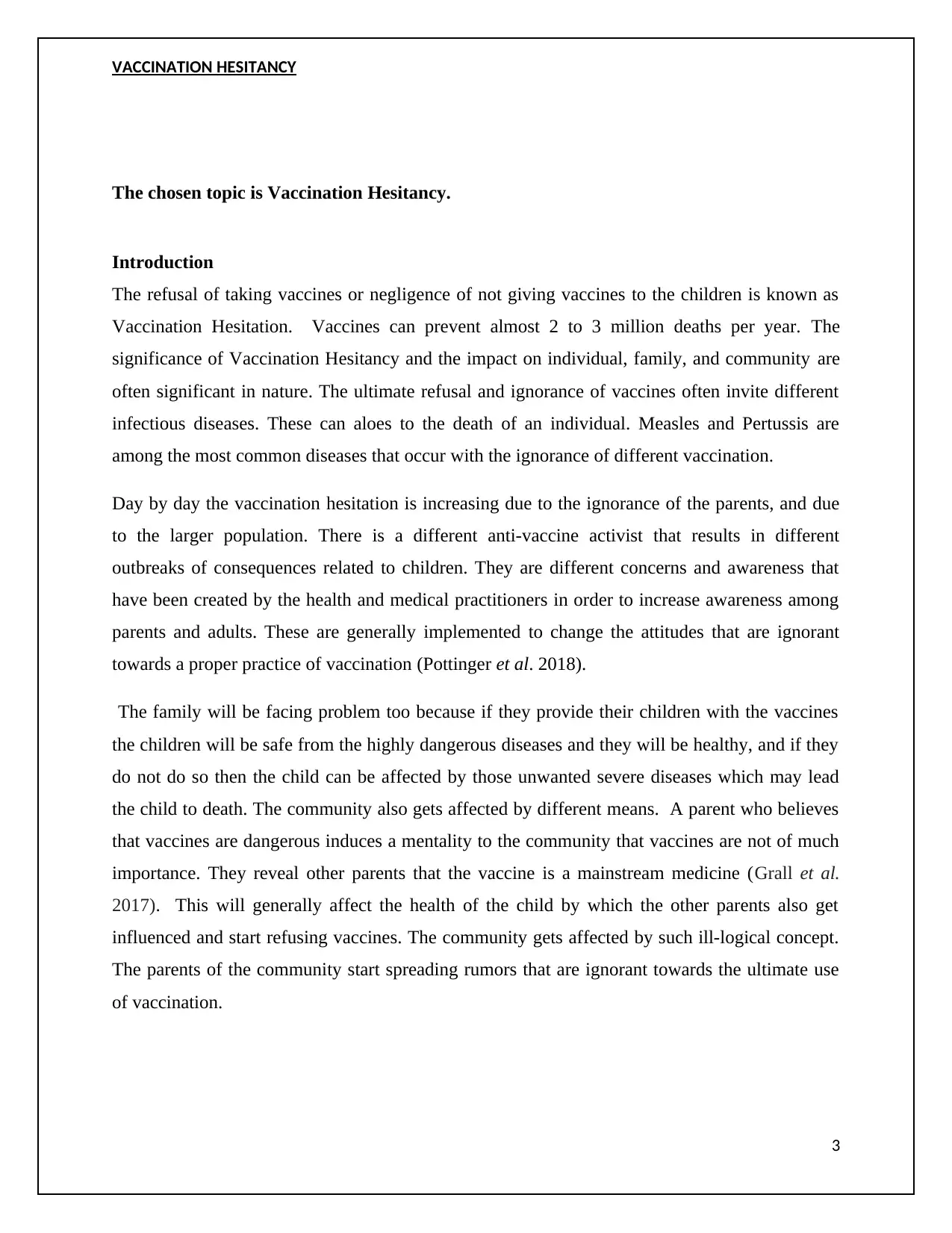
VACCINATION HESITANCY
The chosen topic is Vaccination Hesitancy.
Introduction
The refusal of taking vaccines or negligence of not giving vaccines to the children is known as
Vaccination Hesitation. Vaccines can prevent almost 2 to 3 million deaths per year. The
significance of Vaccination Hesitancy and the impact on individual, family, and community are
often significant in nature. The ultimate refusal and ignorance of vaccines often invite different
infectious diseases. These can aloes to the death of an individual. Measles and Pertussis are
among the most common diseases that occur with the ignorance of different vaccination.
Day by day the vaccination hesitation is increasing due to the ignorance of the parents, and due
to the larger population. There is a different anti-vaccine activist that results in different
outbreaks of consequences related to children. They are different concerns and awareness that
have been created by the health and medical practitioners in order to increase awareness among
parents and adults. These are generally implemented to change the attitudes that are ignorant
towards a proper practice of vaccination (Pottinger et al. 2018).
The family will be facing problem too because if they provide their children with the vaccines
the children will be safe from the highly dangerous diseases and they will be healthy, and if they
do not do so then the child can be affected by those unwanted severe diseases which may lead
the child to death. The community also gets affected by different means. A parent who believes
that vaccines are dangerous induces a mentality to the community that vaccines are not of much
importance. They reveal other parents that the vaccine is a mainstream medicine (Grall et al.
2017). This will generally affect the health of the child by which the other parents also get
influenced and start refusing vaccines. The community gets affected by such ill-logical concept.
The parents of the community start spreading rumors that are ignorant towards the ultimate use
of vaccination.
3
The chosen topic is Vaccination Hesitancy.
Introduction
The refusal of taking vaccines or negligence of not giving vaccines to the children is known as
Vaccination Hesitation. Vaccines can prevent almost 2 to 3 million deaths per year. The
significance of Vaccination Hesitancy and the impact on individual, family, and community are
often significant in nature. The ultimate refusal and ignorance of vaccines often invite different
infectious diseases. These can aloes to the death of an individual. Measles and Pertussis are
among the most common diseases that occur with the ignorance of different vaccination.
Day by day the vaccination hesitation is increasing due to the ignorance of the parents, and due
to the larger population. There is a different anti-vaccine activist that results in different
outbreaks of consequences related to children. They are different concerns and awareness that
have been created by the health and medical practitioners in order to increase awareness among
parents and adults. These are generally implemented to change the attitudes that are ignorant
towards a proper practice of vaccination (Pottinger et al. 2018).
The family will be facing problem too because if they provide their children with the vaccines
the children will be safe from the highly dangerous diseases and they will be healthy, and if they
do not do so then the child can be affected by those unwanted severe diseases which may lead
the child to death. The community also gets affected by different means. A parent who believes
that vaccines are dangerous induces a mentality to the community that vaccines are not of much
importance. They reveal other parents that the vaccine is a mainstream medicine (Grall et al.
2017). This will generally affect the health of the child by which the other parents also get
influenced and start refusing vaccines. The community gets affected by such ill-logical concept.
The parents of the community start spreading rumors that are ignorant towards the ultimate use
of vaccination.
3
⊘ This is a preview!⊘
Do you want full access?
Subscribe today to unlock all pages.

Trusted by 1+ million students worldwide
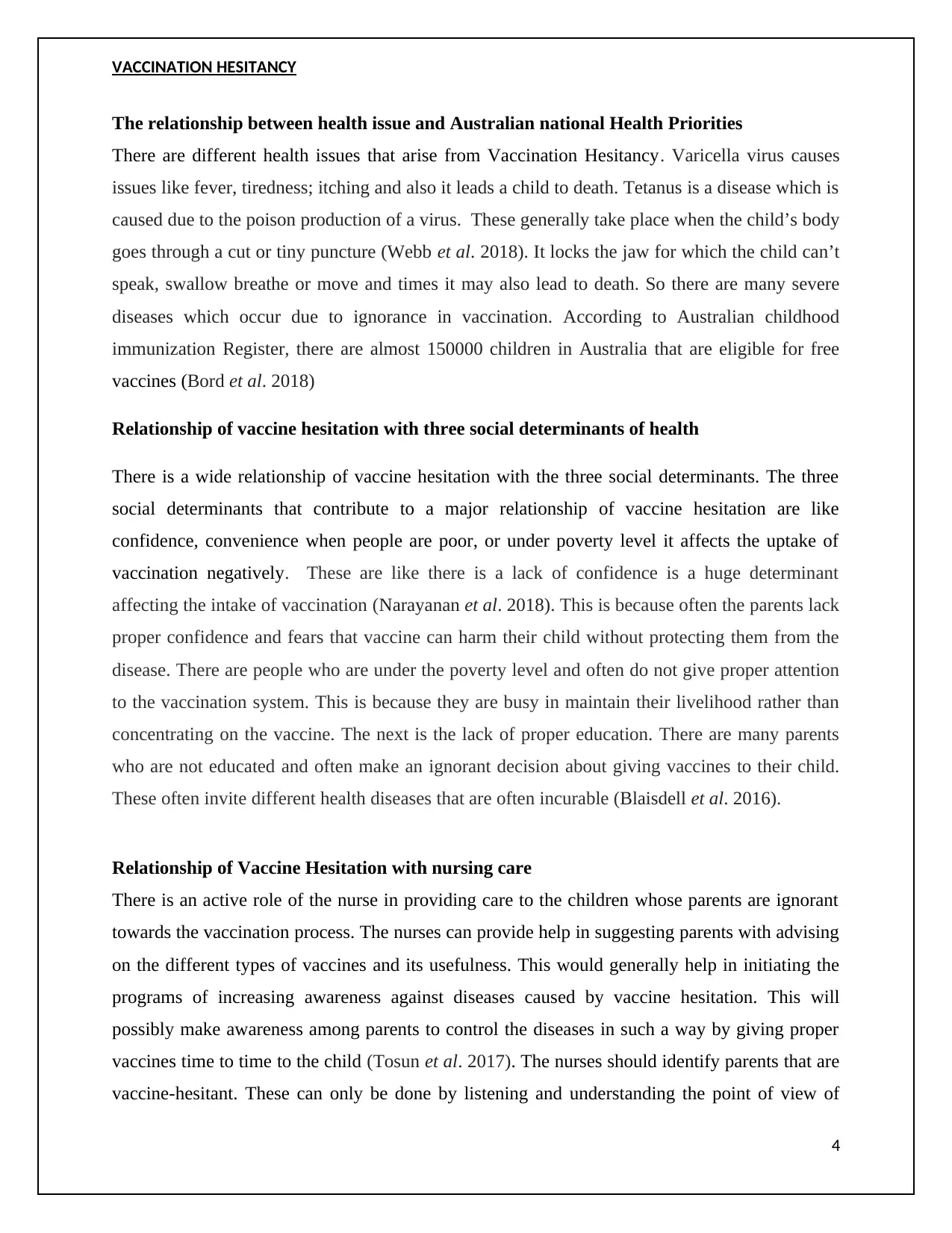
VACCINATION HESITANCY
The relationship between health issue and Australian national Health Priorities
There are different health issues that arise from Vaccination Hesitancy. Varicella virus causes
issues like fever, tiredness; itching and also it leads a child to death. Tetanus is a disease which is
caused due to the poison production of a virus. These generally take place when the child’s body
goes through a cut or tiny puncture (Webb et al. 2018). It locks the jaw for which the child can’t
speak, swallow breathe or move and times it may also lead to death. So there are many severe
diseases which occur due to ignorance in vaccination. According to Australian childhood
immunization Register, there are almost 150000 children in Australia that are eligible for free
vaccines (Bord et al. 2018)
Relationship of vaccine hesitation with three social determinants of health
There is a wide relationship of vaccine hesitation with the three social determinants. The three
social determinants that contribute to a major relationship of vaccine hesitation are like
confidence, convenience when people are poor, or under poverty level it affects the uptake of
vaccination negatively. These are like there is a lack of confidence is a huge determinant
affecting the intake of vaccination (Narayanan et al. 2018). This is because often the parents lack
proper confidence and fears that vaccine can harm their child without protecting them from the
disease. There are people who are under the poverty level and often do not give proper attention
to the vaccination system. This is because they are busy in maintain their livelihood rather than
concentrating on the vaccine. The next is the lack of proper education. There are many parents
who are not educated and often make an ignorant decision about giving vaccines to their child.
These often invite different health diseases that are often incurable (Blaisdell et al. 2016).
Relationship of Vaccine Hesitation with nursing care
There is an active role of the nurse in providing care to the children whose parents are ignorant
towards the vaccination process. The nurses can provide help in suggesting parents with advising
on the different types of vaccines and its usefulness. This would generally help in initiating the
programs of increasing awareness against diseases caused by vaccine hesitation. This will
possibly make awareness among parents to control the diseases in such a way by giving proper
vaccines time to time to the child (Tosun et al. 2017). The nurses should identify parents that are
vaccine-hesitant. These can only be done by listening and understanding the point of view of
4
The relationship between health issue and Australian national Health Priorities
There are different health issues that arise from Vaccination Hesitancy. Varicella virus causes
issues like fever, tiredness; itching and also it leads a child to death. Tetanus is a disease which is
caused due to the poison production of a virus. These generally take place when the child’s body
goes through a cut or tiny puncture (Webb et al. 2018). It locks the jaw for which the child can’t
speak, swallow breathe or move and times it may also lead to death. So there are many severe
diseases which occur due to ignorance in vaccination. According to Australian childhood
immunization Register, there are almost 150000 children in Australia that are eligible for free
vaccines (Bord et al. 2018)
Relationship of vaccine hesitation with three social determinants of health
There is a wide relationship of vaccine hesitation with the three social determinants. The three
social determinants that contribute to a major relationship of vaccine hesitation are like
confidence, convenience when people are poor, or under poverty level it affects the uptake of
vaccination negatively. These are like there is a lack of confidence is a huge determinant
affecting the intake of vaccination (Narayanan et al. 2018). This is because often the parents lack
proper confidence and fears that vaccine can harm their child without protecting them from the
disease. There are people who are under the poverty level and often do not give proper attention
to the vaccination system. This is because they are busy in maintain their livelihood rather than
concentrating on the vaccine. The next is the lack of proper education. There are many parents
who are not educated and often make an ignorant decision about giving vaccines to their child.
These often invite different health diseases that are often incurable (Blaisdell et al. 2016).
Relationship of Vaccine Hesitation with nursing care
There is an active role of the nurse in providing care to the children whose parents are ignorant
towards the vaccination process. The nurses can provide help in suggesting parents with advising
on the different types of vaccines and its usefulness. This would generally help in initiating the
programs of increasing awareness against diseases caused by vaccine hesitation. This will
possibly make awareness among parents to control the diseases in such a way by giving proper
vaccines time to time to the child (Tosun et al. 2017). The nurses should identify parents that are
vaccine-hesitant. These can only be done by listening and understanding the point of view of
4
Paraphrase This Document
Need a fresh take? Get an instant paraphrase of this document with our AI Paraphraser
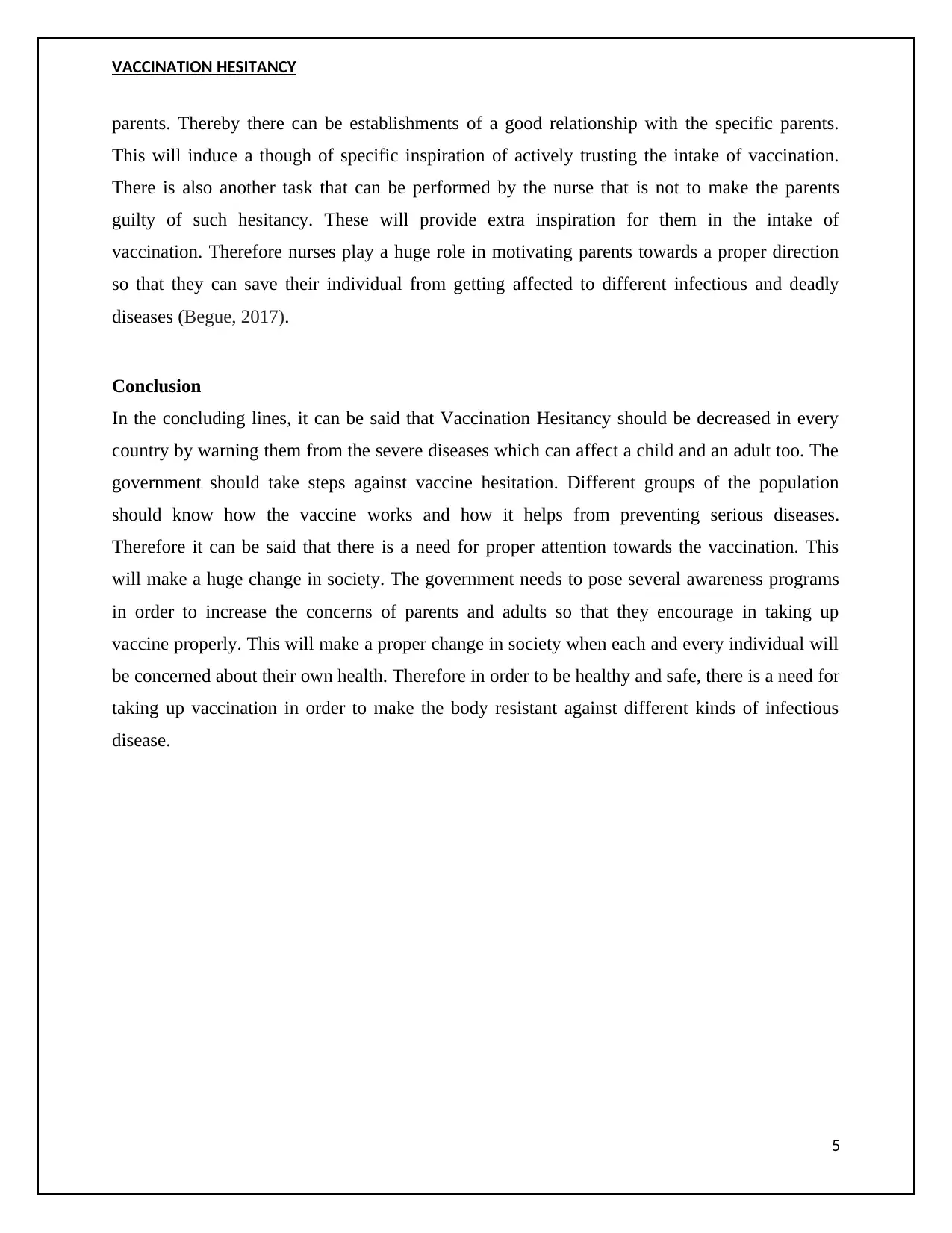
VACCINATION HESITANCY
parents. Thereby there can be establishments of a good relationship with the specific parents.
This will induce a though of specific inspiration of actively trusting the intake of vaccination.
There is also another task that can be performed by the nurse that is not to make the parents
guilty of such hesitancy. These will provide extra inspiration for them in the intake of
vaccination. Therefore nurses play a huge role in motivating parents towards a proper direction
so that they can save their individual from getting affected to different infectious and deadly
diseases (Begue, 2017).
Conclusion
In the concluding lines, it can be said that Vaccination Hesitancy should be decreased in every
country by warning them from the severe diseases which can affect a child and an adult too. The
government should take steps against vaccine hesitation. Different groups of the population
should know how the vaccine works and how it helps from preventing serious diseases.
Therefore it can be said that there is a need for proper attention towards the vaccination. This
will make a huge change in society. The government needs to pose several awareness programs
in order to increase the concerns of parents and adults so that they encourage in taking up
vaccine properly. This will make a proper change in society when each and every individual will
be concerned about their own health. Therefore in order to be healthy and safe, there is a need for
taking up vaccination in order to make the body resistant against different kinds of infectious
disease.
5
parents. Thereby there can be establishments of a good relationship with the specific parents.
This will induce a though of specific inspiration of actively trusting the intake of vaccination.
There is also another task that can be performed by the nurse that is not to make the parents
guilty of such hesitancy. These will provide extra inspiration for them in the intake of
vaccination. Therefore nurses play a huge role in motivating parents towards a proper direction
so that they can save their individual from getting affected to different infectious and deadly
diseases (Begue, 2017).
Conclusion
In the concluding lines, it can be said that Vaccination Hesitancy should be decreased in every
country by warning them from the severe diseases which can affect a child and an adult too. The
government should take steps against vaccine hesitation. Different groups of the population
should know how the vaccine works and how it helps from preventing serious diseases.
Therefore it can be said that there is a need for proper attention towards the vaccination. This
will make a huge change in society. The government needs to pose several awareness programs
in order to increase the concerns of parents and adults so that they encourage in taking up
vaccine properly. This will make a proper change in society when each and every individual will
be concerned about their own health. Therefore in order to be healthy and safe, there is a need for
taking up vaccination in order to make the body resistant against different kinds of infectious
disease.
5
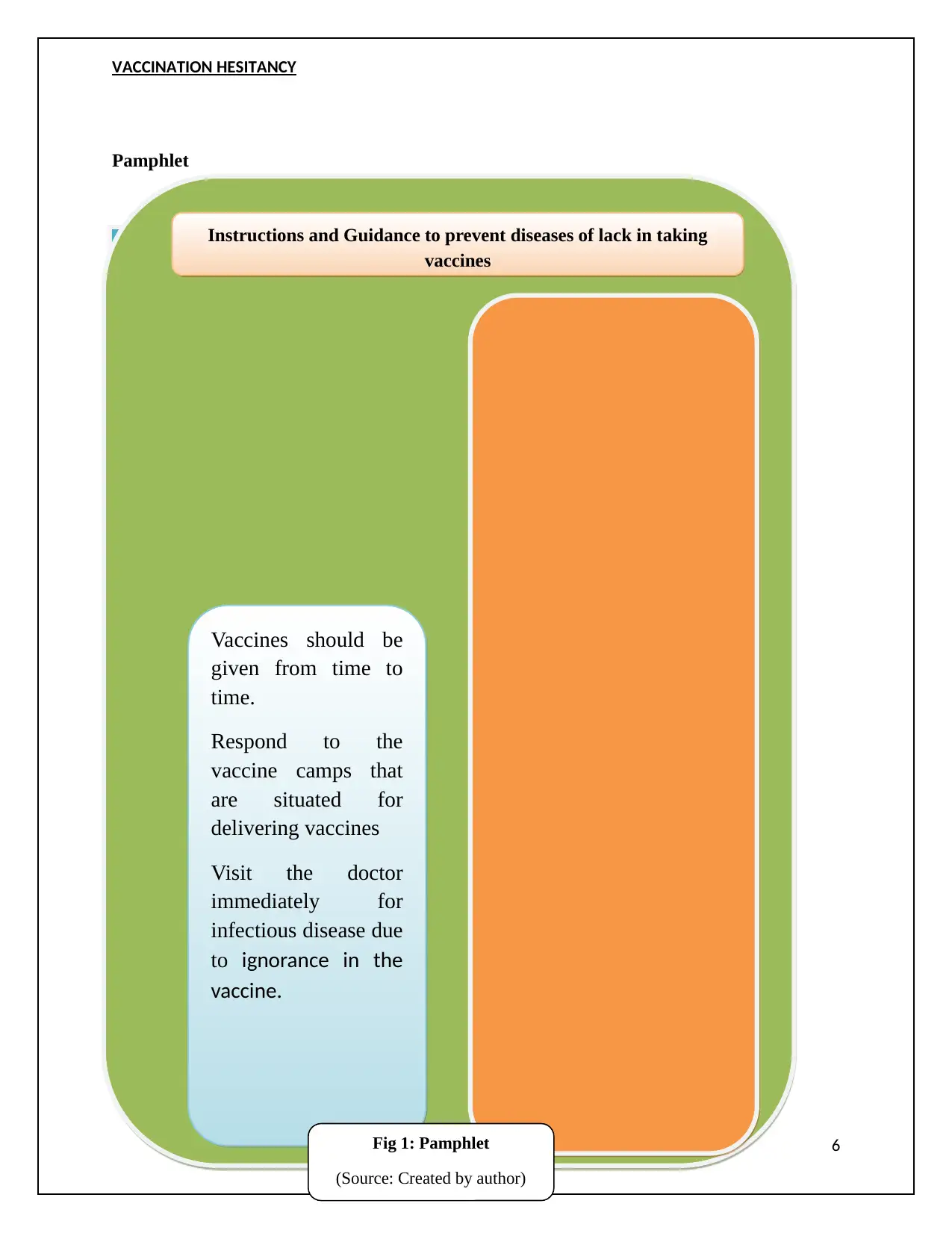
VACCINATION HESITANCY
Pamphlet
6
Instructions and Guidance to prevent diseases of lack in taking
vaccines
Vaccines should be
given from time to
time.
Respond to the
vaccine camps that
are situated for
delivering vaccines
Visit the doctor
immediately for
infectious disease due
to ignorance in the
vaccine.
Fig 1: Pamphlet
(Source: Created by author)
Pamphlet
6
Instructions and Guidance to prevent diseases of lack in taking
vaccines
Vaccines should be
given from time to
time.
Respond to the
vaccine camps that
are situated for
delivering vaccines
Visit the doctor
immediately for
infectious disease due
to ignorance in the
vaccine.
Fig 1: Pamphlet
(Source: Created by author)
⊘ This is a preview!⊘
Do you want full access?
Subscribe today to unlock all pages.

Trusted by 1+ million students worldwide
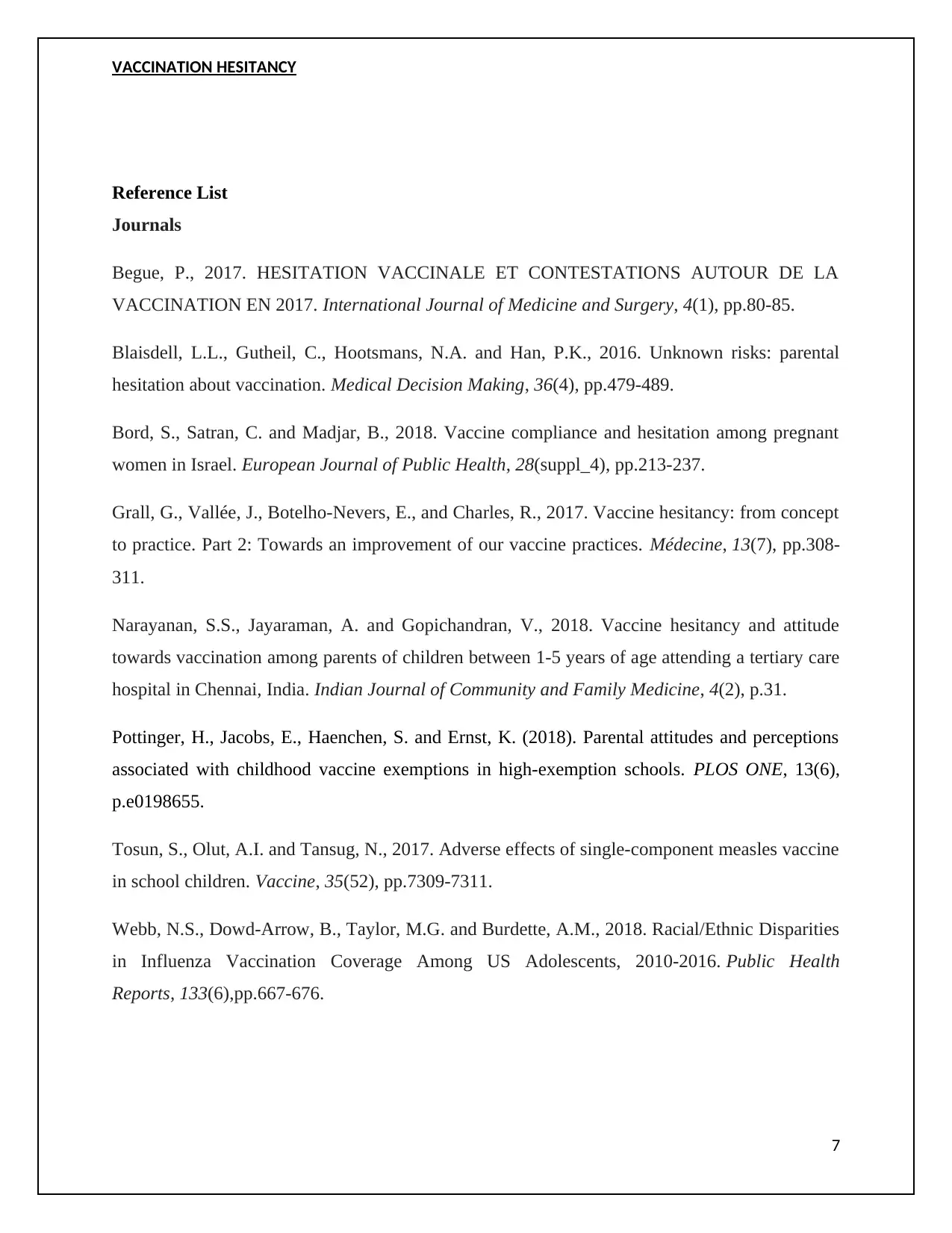
VACCINATION HESITANCY
Reference List
Journals
Begue, P., 2017. HESITATION VACCINALE ET CONTESTATIONS AUTOUR DE LA
VACCINATION EN 2017. International Journal of Medicine and Surgery, 4(1), pp.80-85.
Blaisdell, L.L., Gutheil, C., Hootsmans, N.A. and Han, P.K., 2016. Unknown risks: parental
hesitation about vaccination. Medical Decision Making, 36(4), pp.479-489.
Bord, S., Satran, C. and Madjar, B., 2018. Vaccine compliance and hesitation among pregnant
women in Israel. European Journal of Public Health, 28(suppl_4), pp.213-237.
Grall, G., Vallée, J., Botelho-Nevers, E., and Charles, R., 2017. Vaccine hesitancy: from concept
to practice. Part 2: Towards an improvement of our vaccine practices. Médecine, 13(7), pp.308-
311.
Narayanan, S.S., Jayaraman, A. and Gopichandran, V., 2018. Vaccine hesitancy and attitude
towards vaccination among parents of children between 1-5 years of age attending a tertiary care
hospital in Chennai, India. Indian Journal of Community and Family Medicine, 4(2), p.31.
Pottinger, H., Jacobs, E., Haenchen, S. and Ernst, K. (2018). Parental attitudes and perceptions
associated with childhood vaccine exemptions in high-exemption schools. PLOS ONE, 13(6),
p.e0198655.
Tosun, S., Olut, A.I. and Tansug, N., 2017. Adverse effects of single-component measles vaccine
in school children. Vaccine, 35(52), pp.7309-7311.
Webb, N.S., Dowd-Arrow, B., Taylor, M.G. and Burdette, A.M., 2018. Racial/Ethnic Disparities
in Influenza Vaccination Coverage Among US Adolescents, 2010-2016. Public Health
Reports, 133(6),pp.667-676.
7
Reference List
Journals
Begue, P., 2017. HESITATION VACCINALE ET CONTESTATIONS AUTOUR DE LA
VACCINATION EN 2017. International Journal of Medicine and Surgery, 4(1), pp.80-85.
Blaisdell, L.L., Gutheil, C., Hootsmans, N.A. and Han, P.K., 2016. Unknown risks: parental
hesitation about vaccination. Medical Decision Making, 36(4), pp.479-489.
Bord, S., Satran, C. and Madjar, B., 2018. Vaccine compliance and hesitation among pregnant
women in Israel. European Journal of Public Health, 28(suppl_4), pp.213-237.
Grall, G., Vallée, J., Botelho-Nevers, E., and Charles, R., 2017. Vaccine hesitancy: from concept
to practice. Part 2: Towards an improvement of our vaccine practices. Médecine, 13(7), pp.308-
311.
Narayanan, S.S., Jayaraman, A. and Gopichandran, V., 2018. Vaccine hesitancy and attitude
towards vaccination among parents of children between 1-5 years of age attending a tertiary care
hospital in Chennai, India. Indian Journal of Community and Family Medicine, 4(2), p.31.
Pottinger, H., Jacobs, E., Haenchen, S. and Ernst, K. (2018). Parental attitudes and perceptions
associated with childhood vaccine exemptions in high-exemption schools. PLOS ONE, 13(6),
p.e0198655.
Tosun, S., Olut, A.I. and Tansug, N., 2017. Adverse effects of single-component measles vaccine
in school children. Vaccine, 35(52), pp.7309-7311.
Webb, N.S., Dowd-Arrow, B., Taylor, M.G. and Burdette, A.M., 2018. Racial/Ethnic Disparities
in Influenza Vaccination Coverage Among US Adolescents, 2010-2016. Public Health
Reports, 133(6),pp.667-676.
7
1 out of 7
Related Documents
Your All-in-One AI-Powered Toolkit for Academic Success.
+13062052269
info@desklib.com
Available 24*7 on WhatsApp / Email
![[object Object]](/_next/static/media/star-bottom.7253800d.svg)
Unlock your academic potential
Copyright © 2020–2026 A2Z Services. All Rights Reserved. Developed and managed by ZUCOL.





